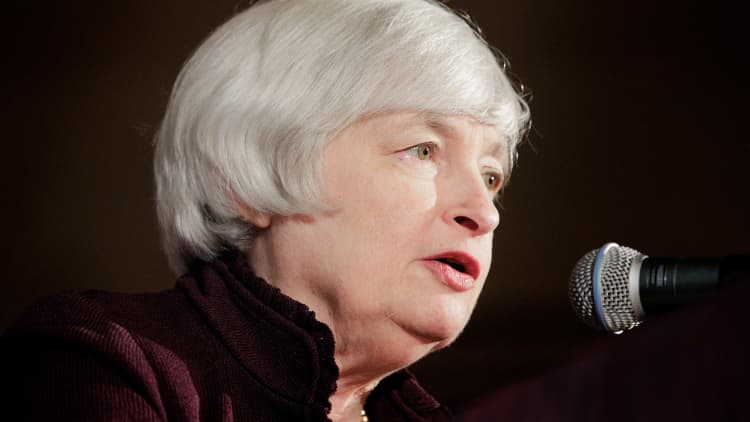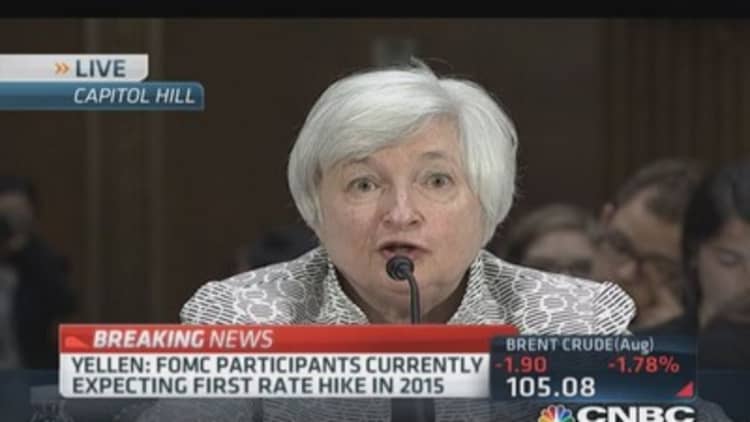
Fed Chair Janet Yellen gave a tepid thumbs-up Tuesday to the economic recovery while expressing disappointment in housing and pledging to remain vigilant over asset bubbles.
While Yellen's remarks to a Senate committee were mostly benign and cautious on the economy, a separate Federal Reserve report indicated concern over asset prices.
"Valuation metrics in some sectors do appear substantially stretched—particularly those for smaller firms in the social media and biotechnology industries, despite a notable downturn in equity prices for such firms early in the year," remarks in the full policy report accompanying her testimony said.
The comments gave the market some pause, sending shares in Yelp, for instance, down more than 4 percent and all of the major indexes into negative territory. Broadly speaking, social media and biotech stocks led decliners on the Nasdaq, which was off more than 1 percent before recovering some of the losses.
More broadly, though, Yellen, while noting dangers of "a reach for yield" among investors that was keeping volatility low, said asset prices "remain generally in line with historical norms."
The Fed chair gave no specific indications as to when the central bank will begin raising interest rates other than probably in 2015, and broke from previous unemployment and inflation targets for when a rate might be considered.
"There's no formula and there's no mechanical answer that I can give you about when the first rate increase will occur," she said during the question-and-answer portion of her testimony before the Senate Banking Committee. "It will depend on the progress of our economy and how we assess it based on a variety of indicators."
Several senators questioned Yellen over the potential of speculation and creation of asset bubbles created by Fed policy. She generally has dismissed charges that the Fed has caused dangers but did acknowledge the potential.
"When interest rates begin to rise, if firms or individuals have taken risks and aren't adequately prepared to deal with them that can cause distress," she said. "Among the institutions that we supervise we're certainly looking at management of interest rate risk."
In her initial remarks during semi-annual testimony to Congress, Yellen said there were signs of a production and spending rebound in the second quarter, but "this bears close watching."
Yellen also noted that housing activity has been disappointing, with the sector showing "little progress" of late with readings this year "disappointing" as mortgage rates have edged higher.
The remarks were part of what once was known as the "Humphrey Hakwins" testimony in which the central bank chief apprises lawmakers of the state of policy and the U.S. economy. Yellen's testimony came as the Fed looks to end its monthly bond-buying program—currently at $35 billion—and contemplates when to begin raising short-term interest rates from near-zero levels.
Some of the questioning got a bit more granular, though. Sen. Elizabeth Warren, D-Mass., questioned Yellen on whether large financial institutions remained a threat the economy. She pointed out that JPMorgan Chase, for instance, has 3,391 subsidiaries—more than three times the number of Lehman Brothers when it failed in 2008 and triggered the worst of the financial crisis.
For the most part, though, the exchanges were cordial, with Yellen straddling the line between expressing confidence in the recovery and caution that the central bank's job is not finished.
Read MoreLooks like the Fed wants to have even more power
"The economy is continuing to make progress toward the Federal Reserve's objectives of maximum employment and price stability," Yellen said.
She cautioned, though, that it's important for policymakers not to get overly optimistic about the pace of recovery, indicating continued concern over whether the economy is ready to stand on its own.
"We need to be careful to make sure that the economy is on a solid trajectory before we consider raising interest rates," Yellen said during questioning. "I think the forward guidance that we have provided in the policies that we have put in place are providing a great deal of accommodation to the economy to make sure that it is on a solid trajectory."

Though the economy slumped 2.9 percent in the first quarter, Yellen continued to insist that factors contributing to the decline in gross domestic product were an aberration unlikely to be repeated.
"The decline appears to have resulted mostly from transitory factors, and a number of recent indicators of production and spending suggest that growth rebounded in the second quarter, but this bears close watching," she said.
Economic activity probably will grow at "a moderate pace over the next several years"—a comment that would help the Fed justify its extreme monetary accommodation even though the financial crisis-inspired recession ended five years ago and the stock market, as measured by the index, has gained 197 percent since its March 2009 low.
Read MoreWage inflation is a good thing: Pimco's McCulley
Other gauges on economic strength have not been as positive. Unemployment is at 6.1 percent, but job creation has been titled toward part-time positions and long-term employment remains a challenge. Wages have stagnated even as energy and food costs have escalated significantly.
Still, the jobless rate already has hit the Fed's estimate for the year and is well below the original 6.5 percent target it had set before considering a rate hike. Inflation, as measured through the personal consumption expenditures index, remains below the Fed's target.
—By CNBC's Jeff Cox


